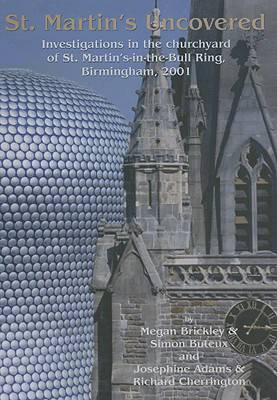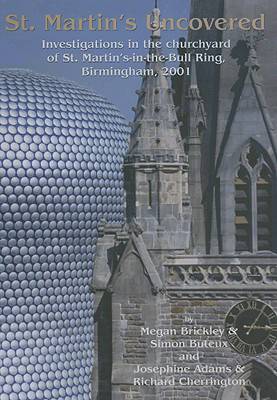
Je cadeautjes zeker op tijd in huis hebben voor de feestdagen? Kom langs in onze winkels en vind het perfecte geschenk!
- Afhalen na 1 uur in een winkel met voorraad
- Gratis thuislevering in België vanaf € 30
- Ruim aanbod met 7 miljoen producten
Je cadeautjes zeker op tijd in huis hebben voor de feestdagen? Kom langs in onze winkels en vind het perfecte geschenk!
- Afhalen na 1 uur in een winkel met voorraad
- Gratis thuislevering in België vanaf € 30
- Ruim aanbod met 7 miljoen producten
Zoeken
St Martin's Uncovered
Investigations in the Churchyard of St. Martin's-In-The-Bull-Ring, Birmingham, 2001
J Adams, Megan Brickley, Simon Buteux, Tate Adams, Richard Cherrington
Hardcover | Engels
€ 67,45
+ 134 punten
Omschrijving
The archaeological excavations at St. Martin's churchyard, Birmingham uncovered 857 burials dating to the late 18th and the 19th century. The burials represent a cross-section of Birmingham's population during the peiod of the Industrial Revolution. Detailed anthropological analysis was carried out on a sample of 505 of the skeletons, investigating aspects of demography and health. Compared to the modern British population, the analysis revealed a high prevalence of metabolic diseases, such as scurvy and rickets. The results of these and other pathological conditions reveal that there were very real links between the prevalence of diseases and the socio-economic status of the individuals under investigation. This is most striking in the patterns of various types of trauma, which graphically illustrate the hard lives led by working-class women. The investigations also provide insights into burial practices and funerary trade, and documentary research on named individuals from the vaults provides information on family histories which complements and informs the anthropological and archaeological analyses. Throughout the report an attempt is made to place the findings in the context of their social, economic and religious background, in order to provide an integrated analysis. The report concludes with contrasting reconstructions of two funerals at St. Martin's, one of a wealthy iron merchant and the other of a butcher's wife.
Specificaties
Betrokkenen
- Auteur(s):
- Uitgeverij:
Inhoud
- Aantal bladzijden:
- 252
- Taal:
- Engels
Eigenschappen
- Productcode (EAN):
- 9781842172018
- Verschijningsdatum:
- 30/01/2006
- Uitvoering:
- Hardcover
- Formaat:
- Ongenaaid / garenloos gebonden
- Afmetingen:
- 218 mm x 298 mm
- Gewicht:
- 1356 g

Alleen bij Standaard Boekhandel
+ 134 punten op je klantenkaart van Standaard Boekhandel
Beoordelingen
We publiceren alleen reviews die voldoen aan de voorwaarden voor reviews. Bekijk onze voorwaarden voor reviews.









